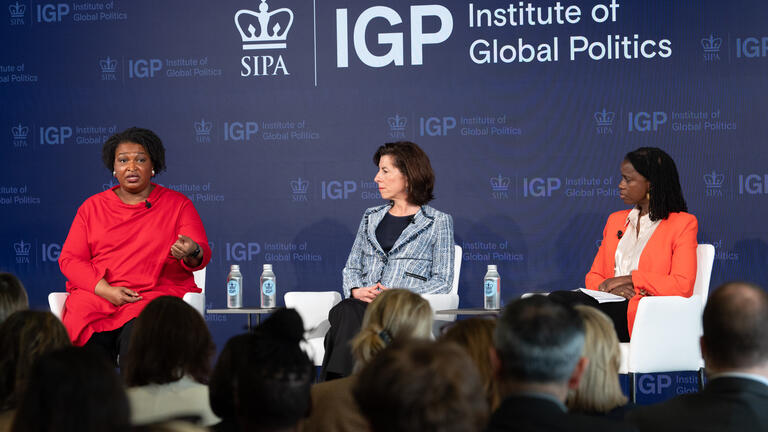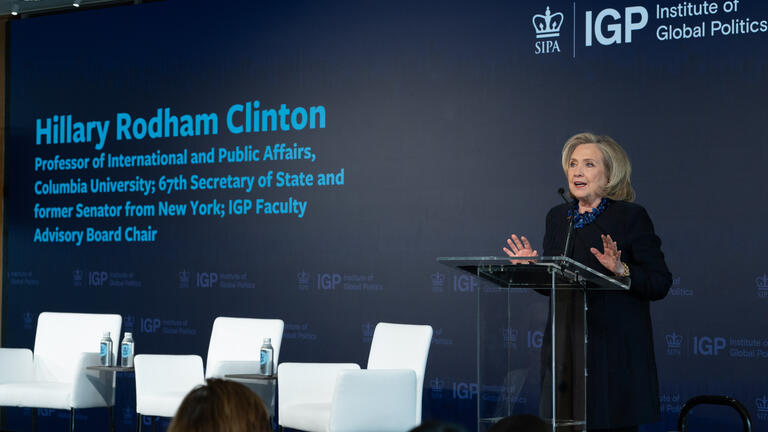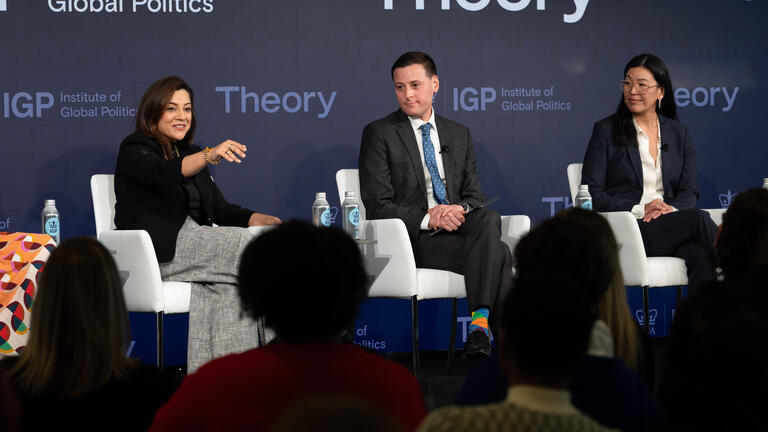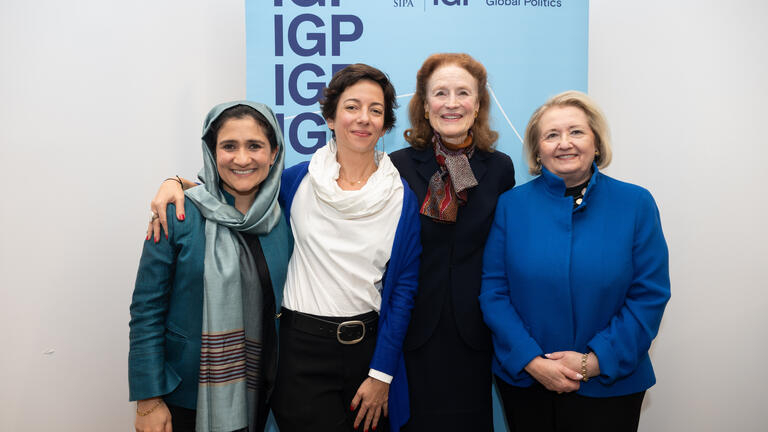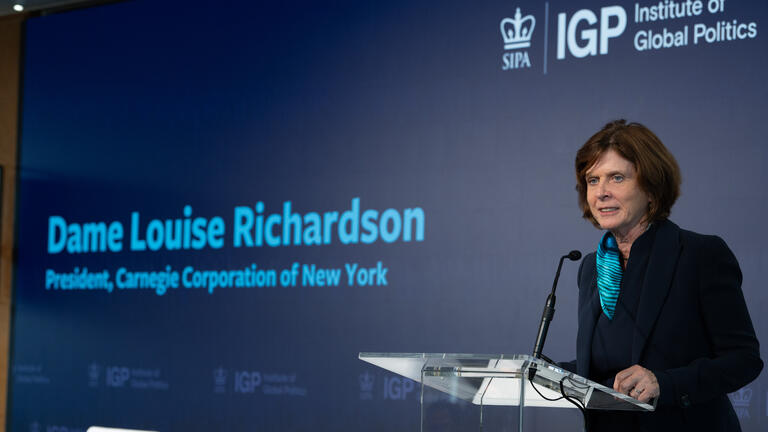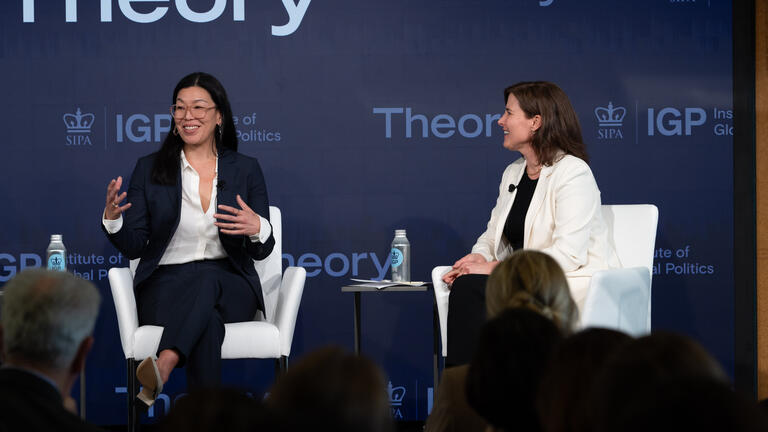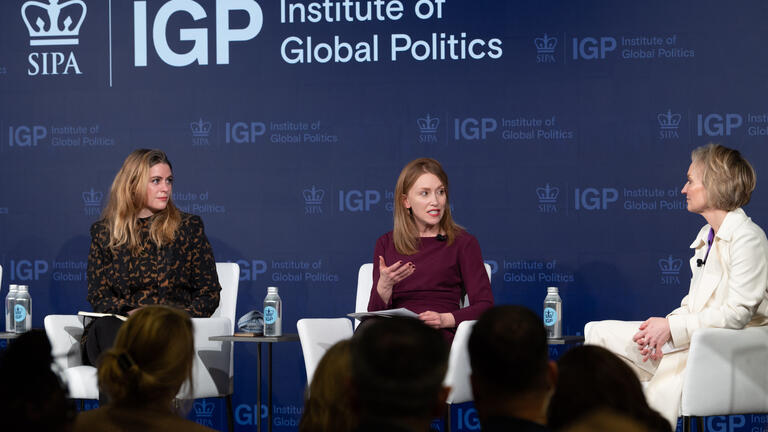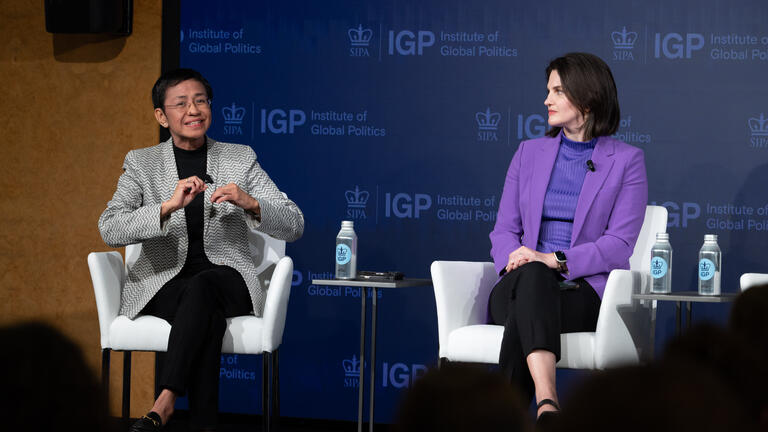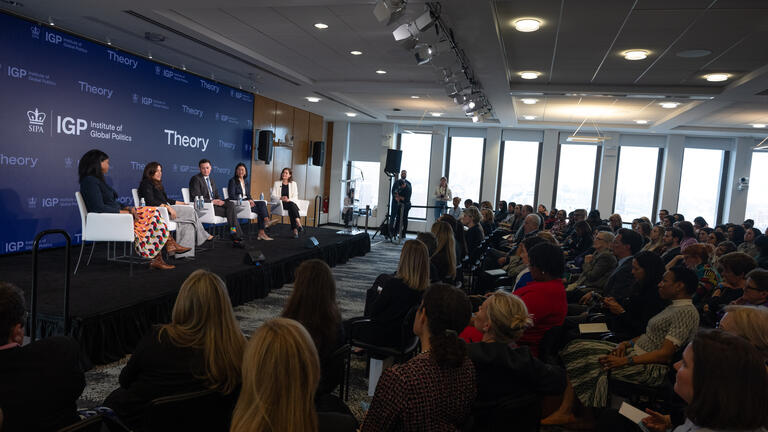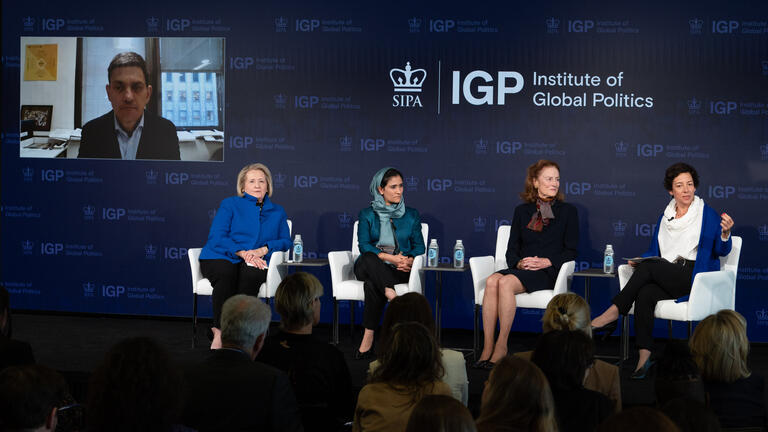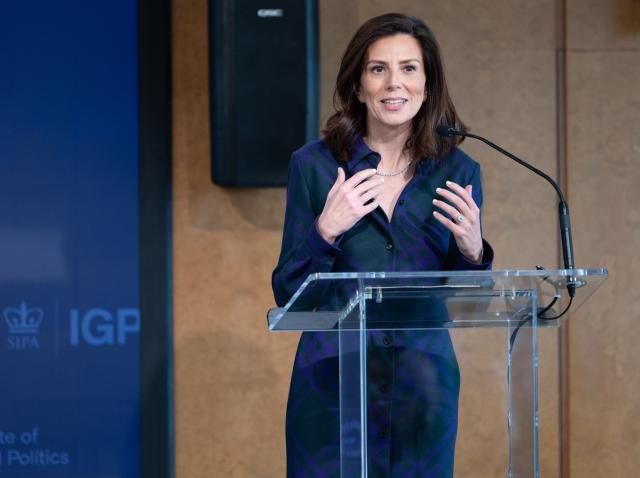
IGP Kicks Off Women’s History Month with the Launch of Its New Women’s Initiative

The Institute of Global Politics (IGP) started a major new chapter with the launch of its Women’s Initiative on March 4 — which took place, fittingly, at the start of Women’s History Month and just a few days before International Women’s Day. The launch event convened some of the world’s leading policymakers, scholars, and advocates to discuss a wide range of pressing issues facing women and girls today, from reproductive rights to gender equity in the workplace to technology-facilitated gender-based violence.

“Because these issues affect not just women but all of humanity, it isn't enough to think domestically or internationally, we need to leverage the same local to global approach we bring to all of our work here at IGP,” said Dean Keren Yarhi-Milo in her introductory remarks.
The Initiative will be centered around four main pillars, all reflected in the panel discussions: women's economic opportunity, women's health, women's safety and security, and women's leadership, democracy, and human rights.
Former Secretary of State Hillary Rodham Clinton, who chairs IGP’s Faculty Advisory Board, said in her opening remarks that the Initiative’s work will focus on gender equality — and emphasized the impediments that must be overcome to truly achieve this essential goal.
“Let me start by saying very clearly that simply embracing the concept of women's rights, let alone enshrining those rights in laws and constitutions, is not the same as achieving full equality,” she said.
“Rights are important. But they are nothing without the power to claim them. And again and again, especially in recent times, we have seen anger, hostility, sexism, and misogyny directed at women who have the audacity to seek power.”
- Hillary Rodham Clinton, 67th US Secretary of State and current Chair of the IGP Faculty Advisory Board
The day’s first discussion, a fireside chat on “Women Powering the Economy,” featured US Secretary of Commerce Gina Raimondo and Stacey Abrams, the voting rights activist and former minority leader of Georgia’s House of Representatives who is now the Ronald W. Walters Endowed Chair for Race and Black Politics at Howard University and an IGP Carnegie Distinguished Fellow.
Raimondo highlighted her collaboration with labor unions to attract and recruit more women to traditionally male-dominated yet high-paying fields like construction, plumbing, and carpentry, — all of which, she said, face labor shortages. As a leader in the effort to expand the hiring pool, Raimondo spoke about the uphill battle to convince male lawmakers on Capitol Hill of the need to provide more subsidized childcare support and apprenticeship initiatives. “As long as these investments are viewed as ‘women's issues’ or ‘social issues,’ we are not going to get them done,” she said.
Too often, Raimondo said, women still tend to cluster in low-wage industries like childcare, a sector of the economy that was hit hard by the pandemic. She said one of her goals as Secretary of Commerce was to double the number of women in construction jobs, which pay much better, from 1 million to 2 million.
“Homogeneity is the enemy of innovation,” Raimondo said of corporations or industries lacking gender diversity and persons of color in positions of power.
“This is an economic issue,” said Abrams. “We [women] have the right to half the economy. We have the right to participate fully in every facet of this economy — and that includes the building trades.”
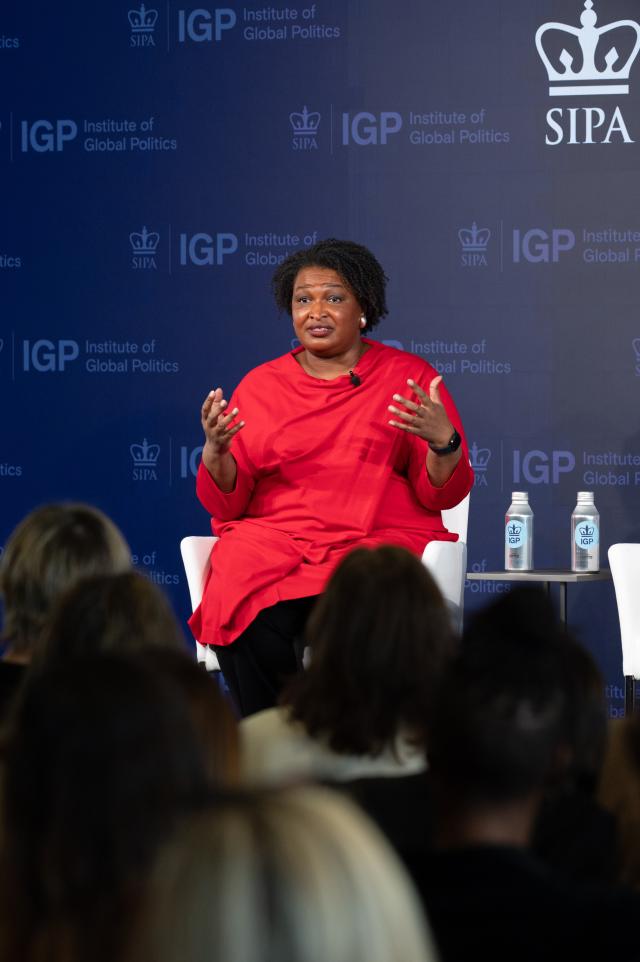
Abrams talked about her work with an organization called Rewiring America to replace outdated home appliances, water heaters, and HVAC systems. “Right now, we're missing 1.4 million people in the workforce to install this equipment,” she said. “Of that 1.4 million, 700,000 should be women. We live in those houses, we turn on that thermostat, we are the ones using that equipment, why shouldn't we be the ones installing it?”
Abrams also talked about the digital inequities that still impact women disproportionately, especially in rural areas. “There has been a devaluation and devolution away from call centers. So if you need help and you try to get someone, you're told to go to the website. If you don't have the internet, you're basically told you're on your own,” she said. “You can’t do telehealth if you can’t get on the internet…. You have hardened issues of access that are exacerbated by the lack of access to the internet and broadband.”
“We have been talking about this for 20 years,” Abrams added. “We have to be incredibly intentional about following our public dollars all the way down.”
The fireside chat between Abrams and Raimondo was followed by a panel with some of SIPA’s prominent alumni in public service, moderated by Secretary Clinton. One participant was Claudia López MPA ’03, who in late 2019 was elected mayor of Bogotá, Colombia, a city of 8 million. López — who became the first woman and the first openly gay person to lead the city — recently left office after a successful four-year term. She says her experience at SIPA enriched her passion to prioritize women’s rights as mayor, creating programs that empowered a quarter of the city’s 4 million women who work in the informal economy as caregivers.
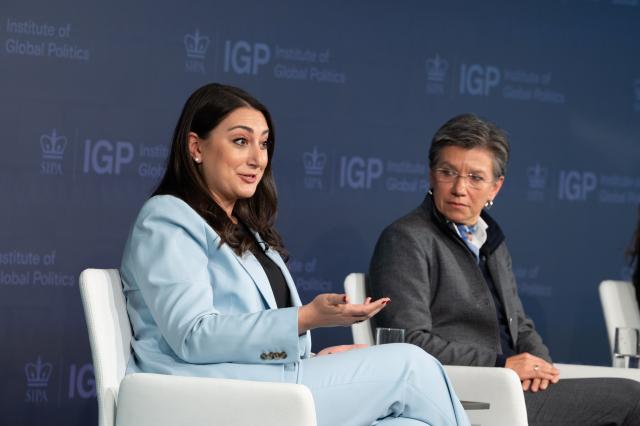
After just one term in Congress, Sara Jacobs MIA ’12 became the youngest member of the House’s Democratic leadership. A representative from California who first ran for office in response to the 2016 election of Donald Trump, Jacobs has sponsored legislation, even working with Republican colleagues across the aisle, around the protection of reproductive health data and allowing women in Congress who have given birth to be able to keep voting before they return – all bills that “ would not have happened if there were not young women in Congress.”
A third participant, Laura Kavanagh MPA ’21, is the first woman to lead New York City’s Fire Department. As fire commissioner, she oversees 17,000 employees and a $2 billion budget. She also directed a recruitment campaign that led to the most diverse applicant pool in FDNY’s history.
“When I got to the fire department, I don't think I knew what I was getting into trying to enact gender equality, frankly,” Kavanagh said. “I knew it would be hard. The fire workforce, for context, is 99 percent male, and that's an increase since I started there. So when I say male dominated, we really mean that at the fire department.”
She added: “What SIPA did for me was help me understand… the structures of power” and how to build support for changing them systematically. As commissioner, Kavanagh said, she has worked toward equal pay for EMS workers, 30 percent of whom are women, and to dispel the impression that women can’t meet certain standards.
Ultimately, Kavanagh said she is working to show that women are welcome in the FDNY workforce, and she knows the example she sets as Commissioner is changing ideas about leadership in the department.
Following the conversation among SIPA alumnae in public service, the launch included a panel on advancing gender equity in the workplace, presented by Theory.
Panelist Reshma Saujani, founder of Girls Who Code and Moms First, discussed the structural challenges facing working moms and young women who aspire to raise families while also enjoying successful careers.
Women “have always been set up to fail,” said Saujani, noting how school days and work day hours rarely align for working moms.
“The United States is the only industrialized nation that doesn’t have paid leave. One in four women go back to work two weeks after having a baby.”
- Reshma Saujani, Founder, Girls Who Code and Moms First
These workplace inequities are what inspired her to launch Moms First, along with three goals: passing child care, passing paid leave, and closing the pay gap.
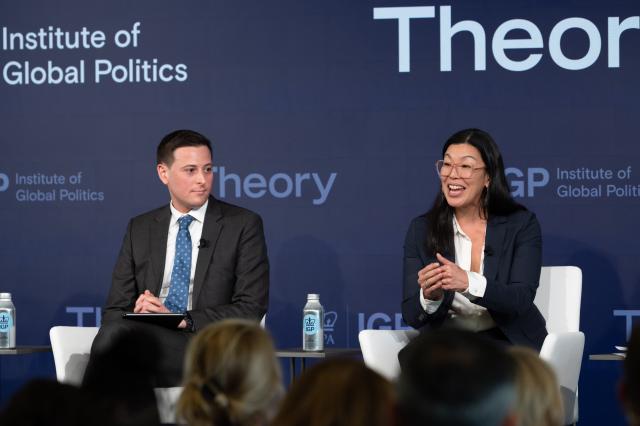
Other subjects included the persistent pay gap between men and women. “The median annual income of home care workers in this country is $23,000 per year,” said Ai-jen Poo, a 1996 Columbia College alumna who is president of the National Domestic Workers Alliance and the executive director of Caring Across Generations. “You cannot as a care worker afford to take care of yourself and your loved ones doing this work. It leads to high rates of turnover and means we can't get access.”
Alexander Hertel-Fernandez, an associate professor at SIPA and IGP Faculty Advisory Board member, explained that when new hires’ compensation is based on their previous wages or salary, then the effects of early discrimination can linger over one’s entire working life. “An important step that employers can take and state and local governments can take and now the federal government can take is breaking that link,” he said, “ and “no longer basing pay based on a worker's past salary.” And indeed, he said the federal government recently joined 20 states and 20 localities in implementing this rule, and also applying it to federal contractors.
In the next discussion, which addressed the role of women and girls in conflict zones and peace processes, International Rescue Committee President and IGP Carnegie Distinguished Fellow David Miliband emphasized the structural inequalities women and girls face in the aid sector. He said that 80 percent of the humanitarian country teams run by the UN in crisis zones “have no plan to reduce gender inequality despite all of the rhetoric about this.”
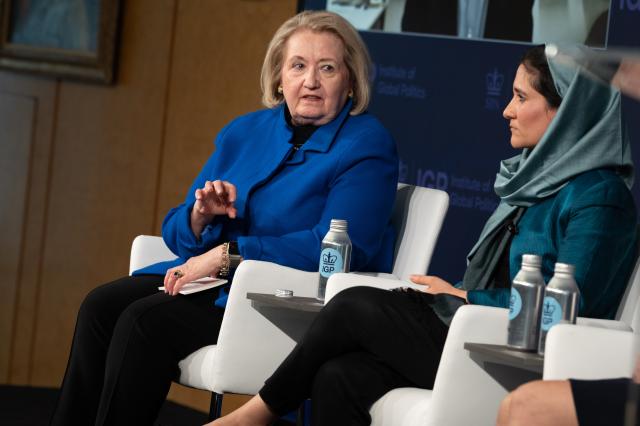
There is an urgent need to get more women at the table to resolve conflict. Citing evidence from the Philippines and Northern Ireland, Ambassador Melanne Verveer, who leads the Georgetown Institute for Women, Peace and Security and served previously as the first US Ambassador for Global Women’s Issues, explained that “when women are at the peace table… there is solid evidence that the issues [they] put on the table would not be there, otherwise.” These include issues like “reconciliation, human rights, economic issues, bringing communities back together, being an honest broker.”
“Those are the kinds of real, tangible inputs that women bring that have positive conclusions to them,” Verveer added.
The day’s fifth panel addressed women’s leadership and the 2024 elections, in which half the world’s population is voting. Speakers stressed how AI and other technologies could be used to interfere with the democratic process during a year of so many elections. “We have a corrupted information ecosystem,” said Maria Ressa, a Nobel Laureate and IGP Carnegie Distinguished Fellow. “Very little has been done to change it.” Across much of the world, she added, attacking women is typically the first step in the degradation of democracy. In that regard, “2024 will be the tipping point.”
Nina Jankowicz, a panelist who became a target of a defamation campaign two years ago when she was appointed to lead counter-disinformation efforts for the Department of Homeland Security, says “things have gotten measurably worse” over the last decade. “Not just in the amount of attacks or the toxicity of the attacks, we now have a tech environment that is enabled by people like Elon Musk who have rolled back the trust and safety measures.” (Jankowicz and SIPA’s Camille François are the coauthors of an upcoming report for IGP and Vital Voices Global Partnership about technology-facilitated gender-based violence.)
Panelists emphasized that important strides have been made in Europe thanks to the Digital Services Act, which raises the bar on content moderation, the importance of academic research; and the promise of alternative tech ecosystems.
In the day’s final panel — “Reproductive Rights Under Attack: Lessons from the US and Abroad” — Alexis McGill Johnson, president and CEO of the Planned Parenthood Action Fund said the state of reproductive rights in the United States is “incredibly dire.”
“You've all seen the maps,” she continued. “Twenty-one states now have abortion bans. That means one in three women and more trans and nonbinary folks are living in states where they no longer have access to abortion care in their state. It means that they are traveling significant miles to get access to care — unless they are being denied access altogether.”
McGill Johnson said the rapidly changing regulations on the ground is causing fatigue among providers everywhere, reducing interest in the OB/GYN specialty among medical students.
Jennifer Klein, who is Assistant to President Biden and director of the White House Gender Policy Council, discussed the recent court decision that endangered IVF treatment in Alabama. “It is important to point out this is a direct consequence, a completely predictable consequence of the overturning of Roe v. Wade, and we know who is responsible for that.”
She said the Biden administration is working hard to protect access to medication abortion, access to contraception, and patient privacy.
“The biggest win we need to keep fighting for, which is to pass federal legislation to restore the protections of Roe.”
-Jennifer Klein, Assistant to the President and Director, White House Gender Policy Council
Sara Casey, an assistant professor at Columbia’s Mailman School of Public Health who directs the RAISE Initiative, said the rollback of rights in the United States threatens women’s health and women’s rights elsewhere. It has “a profound effect of reproductive rights in the global south,” she explained. “They say, ‘The US did it, why can't we?’”
As one of only four countries that has “taken steps backwards” on abortion rights, the United States is a global outlier on restricting reproductive rights for women. Yet the panelists sounded a note of optimism. “Every time [protecting abortion rights] is on the ballot, we win,” said McGill Johnson.
Watch the launch of the IGP Women's Initiative
